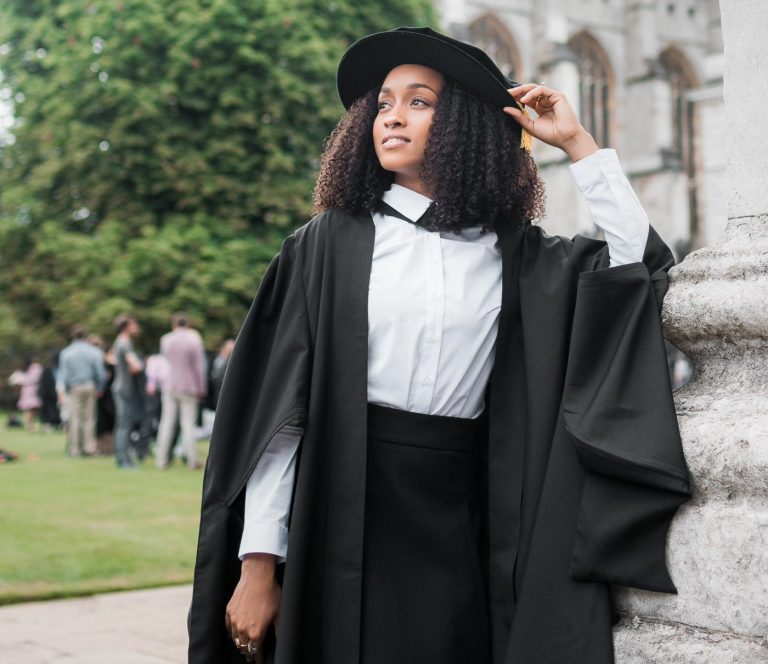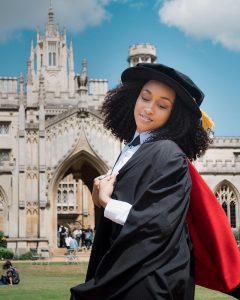
I grew up in the village of Vieille Case, Dominica (not to be confused with the Dominican Republic). From a young age, my parents placed a very strong emphasis on education and encouraged my sisters and me to work hard at school. I always loved school and enjoyed learning. I was also very active in sports (netball, basketball, football, etc). In secondary school, I fell in love with physics, largely due to having an excellent teacher. By the time I started my studies at the Dominica State College (DSC), I was more drawn to chemistry. Again, I had two awesome chemistry teachers and I became completely intrigued with the subject.
After college, I went back to my alma mater (Portsmouth Secondary School) and taught CXC chemistry, physics, mathematics, and integrated science. At that stage in my life, I knew I wanted to pursue higher education but I had no idea where to start (i.e., where to apply, how to apply, how I was going to fund my studies, what degree, etc). I would be the first member of my immediate family to go to university and the entire process seemed completely daunting. Luckily a family friend, Mr. Verieux Mourillon, who had attended the University of the West Indies (UWI, Cave Hill Campus), encouraged me to apply there. I vividly recall that he gave me a UWI booklet and guided me through the application process.
I got accepted to UWI and earned a full scholarship from the Government of Dominica based on my performance at the DSC. At Cave Hill, my majors were chemistry and mathematics. I can recall my mother asking several times, “Chemistry?! What are you going to do with that?”. Quite frankly, I studied these subjects because I liked them but I had no idea where they would take me. In the final year of my undergraduate studies, I had to do a chemistry research thesis. I was very clumsy in chemistry wet labs, so I decided that I wanted to do a computational/theory-based project. I got the opportunity to work with Prof Sean McDowell for my project. I knew immediately that “this was my thing”. I thoroughly enjoyed simulating molecules on the computer and analysing the data to understand chemical phenomena.
After my first degree, I decided to remain at the UWI to pursue an MPhil in Chemistry with Prof McDowell. It was Prof McDowell who encouraged me to apply to the University of Cambridge for my Ph.D.; having earned a Ph.D. there himself. He also assisted me with the Cambridge application (proofing my essays, for example).
Subsequently, I got admission at Cambridge and obtained a full scholarship from the Gates Cambridge Trust. Leaving the Caribbean was hard. As an undergrad student, I had lost both parents, and I dreaded the idea of being far away from my sisters/family. However, after much convincing, I decided that it was time to step out of my comfort zone and to capitalise on that opportunity.
At Cambridge, it was my first time truly dealing with imposter syndrome. In the beginning, I felt very out-of-place in many scientific settings. As a Black woman in STEM, I really struggled to reassure myself that I belonged in these spaces. Though the imposter syndrome never fully went away, it did lessen; over time, I became more confident in myself and forged relationships with other women in STEM who were invaluable sources of support.
As a Ph.D. candidate, I had several experiences that forced me to reflect on my journey in STEM/academia. I realised that at each point of that journey I was incredibly fortunate to have a family member, a friend, a colleague who helped to steer me in the right direction. Indeed my first mentors were my parents; having planted the seeds of education. And then it was the teachers who took interest in my trajectory and opened my eyes to so many opportunities.
Without the invaluable guidance received at critical points in my life, I would not have been the person I am today. Unfortunately, many students in Caribbean households are not as lucky. Many have such great potential but have no idea what steps they need to take to realise their dreams or have no idea as to how big they can dream. Even with good role models as a child, I had no idea what a biophysicist was for example, and I certainly did not know someone who did the work that I now do.
Having realised the benefits of academic and professional mentorship in my own life, in 2017, I launched Carischolar. Carischolar is a Caribbean-based mentoring initiative. Our goal is to connect Caribbean students, aspiring scholars, and young professionals to mentors in their field of study. On the one hand, CariScholar is an opportunity for established academics and professionals from the Caribbean to “pay it forward”; i.e., to help the next generation. On the other hand, it is a mission to ensure that the academic/professional playing field can be leveled for Caribbean nationals and that we all can realise our full potential as one community.
Today, I am a Research Fellow in Physical and Chemical Sciences at King’s College Cambridge, and I work in the lab of Dr. Rosana Collepardo. I hope to one day establish my own research lab and to continue to help aspiring Caribbean scholars realise their full potential. I want to encourage young women interested in STEM careers to seek out advice and mentorship from your lecturers and persons in your field who can guide you along your journey. Don’t be afraid to ask (many) questions and continue to cultivate your sense of curiosity about the world around you. Always remember that your ideas are valid, you belong, and you can do anything that you fully commit to.
About the Author
 Dr. Jerelle A Joseph holds an MPhil in Chemistry and a BSc in Chemistry and Mathematics from the University of the West Indies (Cave Hill Campus, Barbados). She earned a Ph.D. in Chemistry from the University of Cambridge, as a Gates Cambridge Scholar. For her Ph.D. work, under the supervision of Prof David Wales FRS, Jerelle developed computational methods to study large-scale structural changes in proteins. Dr. Joseph is now a Research Fellow in Physical and Chemical Sciences. Her research encompasses developing multiscale approaches to study how cells organised their contents via phase separation. To date, Jerelle has published over 15 peer-reviewed articles and one book chapter in the field of computational chemistry and biophysics. Her most recent work examines the effect of salt on cellular compartmentalisation. You can read about it HERE. Alongside her research, Jerelle is an avid advocate for Caribbean-based mentorship. In 2017, she founded CariScholar; an organisation that connects Caribbean students to established professionals and academics in their field of study. For more advice, connect with Dr. Joseph on Instagram and Twitter.
Dr. Jerelle A Joseph holds an MPhil in Chemistry and a BSc in Chemistry and Mathematics from the University of the West Indies (Cave Hill Campus, Barbados). She earned a Ph.D. in Chemistry from the University of Cambridge, as a Gates Cambridge Scholar. For her Ph.D. work, under the supervision of Prof David Wales FRS, Jerelle developed computational methods to study large-scale structural changes in proteins. Dr. Joseph is now a Research Fellow in Physical and Chemical Sciences. Her research encompasses developing multiscale approaches to study how cells organised their contents via phase separation. To date, Jerelle has published over 15 peer-reviewed articles and one book chapter in the field of computational chemistry and biophysics. Her most recent work examines the effect of salt on cellular compartmentalisation. You can read about it HERE. Alongside her research, Jerelle is an avid advocate for Caribbean-based mentorship. In 2017, she founded CariScholar; an organisation that connects Caribbean students to established professionals and academics in their field of study. For more advice, connect with Dr. Joseph on Instagram and Twitter.
